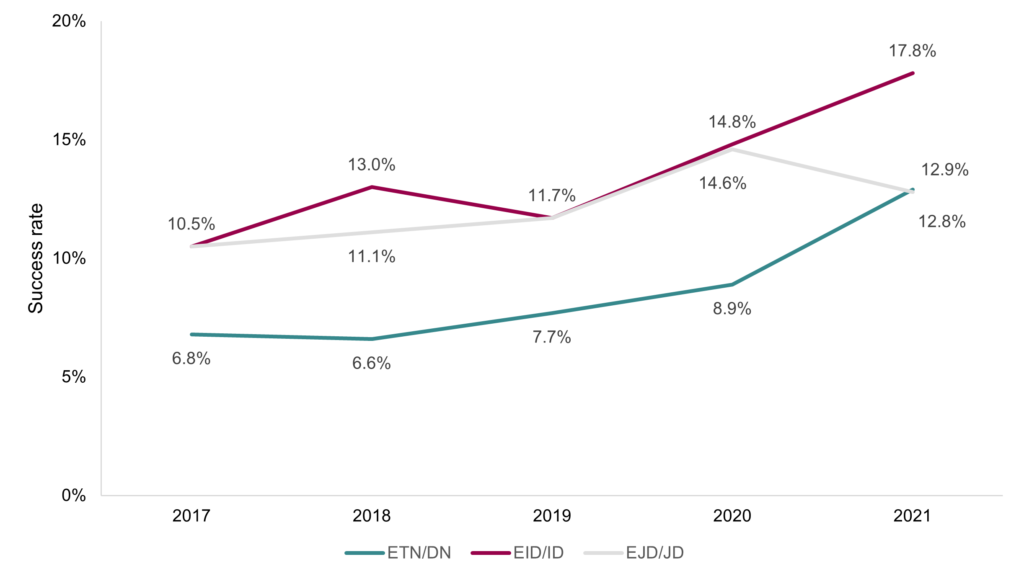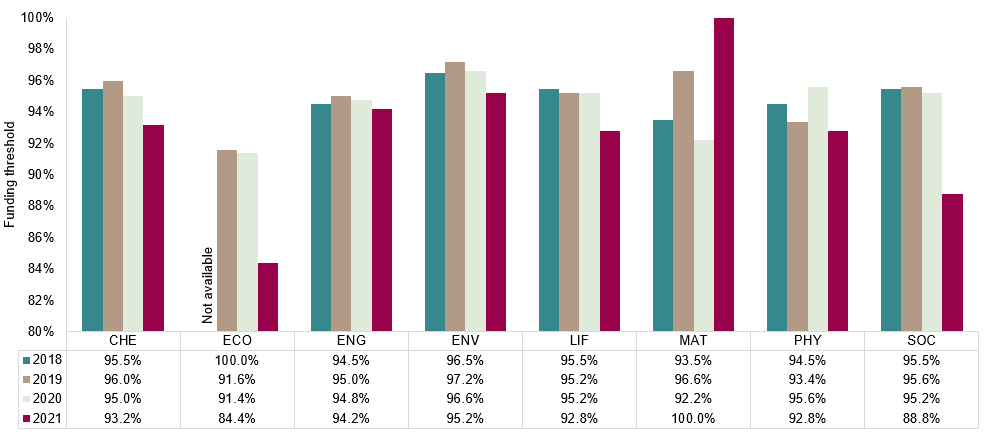Insights into the first MSCA Doctoral Network evaluation results under Horizon Europe
7th April 2022 at 11:55 am
The first MSCA Doctoral Network (DN) proposals under Horizon Europe are now invited to the Grant Agreement preparation. Out of the 1,076 applications, 144 proposals were successful, resulting in an overall success rate of 13.38% for the 2021 call. As anticipated in our previous post, the success rates are higher than what they used to be in Horizon 2020. The overall success rate is more than 3.5 percentage points higher than in the last Horizon 2020 call (9.78%).
We assume that this noticeable increase is due to the reduction in the size of the standard DNs from a total of 540 to 360 researcher months, along with the lower number of submitted proposals. This enables the funding of a higher number of standard DNs, which is by far the most popular type of DN (83% of the total applications in the 2021 call). Therefore, it is not surprising to observe an increase of four percentage points compared to the last Horizon 2020 call (8.90% in 2020 to 12.90% in 2021).

One novelty in Horizon Europe is the absence of dedicated panels for Industrial Doctorates (ID) and Joint Doctorates (JD). As the breakdown of the budget per type of DN was not available, the success rates in IDs and JDs were difficult to predict. With the first results of Horizon Europe, we are now able to give answers. As shown in figure 1, IDs have the highest success rate with an impressive 17.80%, which is three percentage points higher than in the 2020 call. JDs are the type of DNs with the lowest success rate (12.80%). It is also the only type of DN with a decreased success rate (14.60% in 2020). From these results, we can infer that the European Commission tends to prioritise academia-industry collaboration to train new generations of early-career researchers.
When looking into the different panels, we observe that the funding threshold decreased in every panel, except the Mathematics (MAT) one, where only one proposal, which scored 100, was selected for funding. The funding threshold in Social Sciences and Humanities (SSH) dropped from 95.2 in 2020 to 88.8 in the 2021 call. In the Economic Sciences panel (ECO), the funding threshold was 84.40, which would be inconceivable in most of the other panels. The funding threshold in Life Sciences (LIF) and Physics (PHY) decreased by 2.4 and 2.8 points compared to the 2020 call. The funding thresholds have also decreased somewhat in Chemistry (CHE) and Engineering (ENG).

On the reserve list?
The figures above do not include proposals that are on the reserve list. Each year, we see the most highly ranked of these proposals moving up to the main list for funding. The lucky ones should be informed in the summer after the EU Grant Agreements with the initially selected proposals are concluded. You can get in touch with your local MSCA National Contact Point, who should have access to the ranking list.
Next deadline
Has your proposal been rejected? Or did you miss the last deadline? The next one is on 15 November 2022. If you intend to resubmit your proposal, please note that, as of this year, applications that received a score below 80 the previous year will not be eligible for resubmission.
Want to stay informed?
We regularly publish blog posts on Doctoral Networks and many other Horizon Europe and funding topics. You can subscribe to our blog updates on our blog main area.
How can accelopment support your DN project?
Following the first Horizon Europe MSCA-DN evaluation results, we are pleased to be involved in four successful proposals (three DNs and one ID). Part of this achievement results from our long-standing experience in supporting and partnering with ITNs in previous Framework Programmes. In FP7, we were involved in HEALING, SYSWIND, REFINE, TRAIN-ASAP and NeoGel. Our success has continued in Horizon 2020 with ClickGene, EXCILIGHT, EuroNeurotrophin, ImmerSAFE, LightDyNAmics, PEARRL and Train2Target, which we supported from start to finish, and the ongoing AGePOP, CAPSTONE, CONSENSE, InPharma, MORE, MOSAICS, MUSIQ, NanoCarb, NATURE-ETN, and STACCATO.
In these ITNs, we provide professional assistance with Project Management, communication activities and dissemination measures. Additionally, we contribute to their training programmes with our transferable skills courses on research project management, science communication, data management, gender equality, funding opportunities and grant writing. If you are interested in our support for your newly-funded DN project, contact our ITN/DN experts, Jacqueline Strehler.

Jacqueline Strehler
Research & Innovation Project Manager
